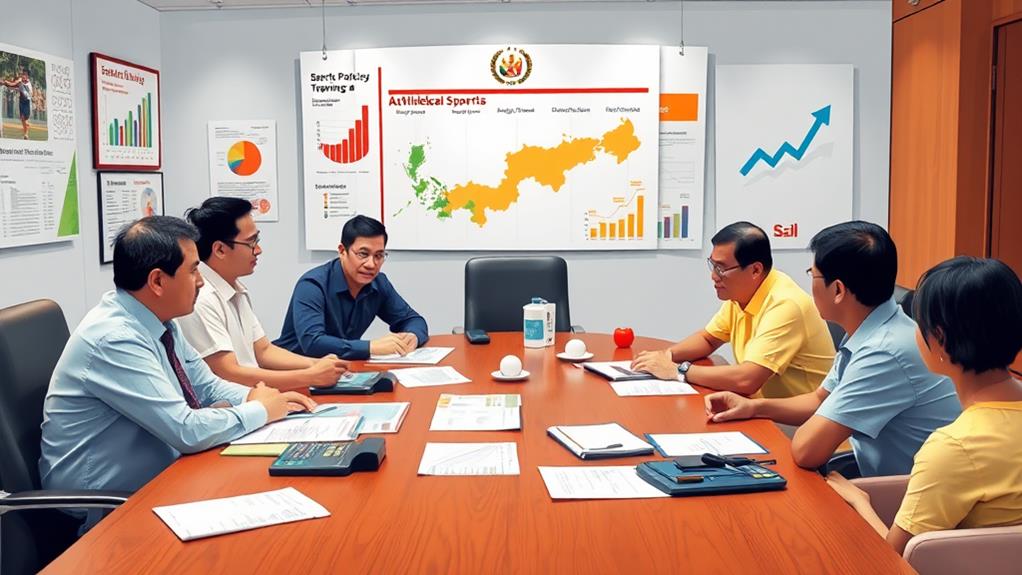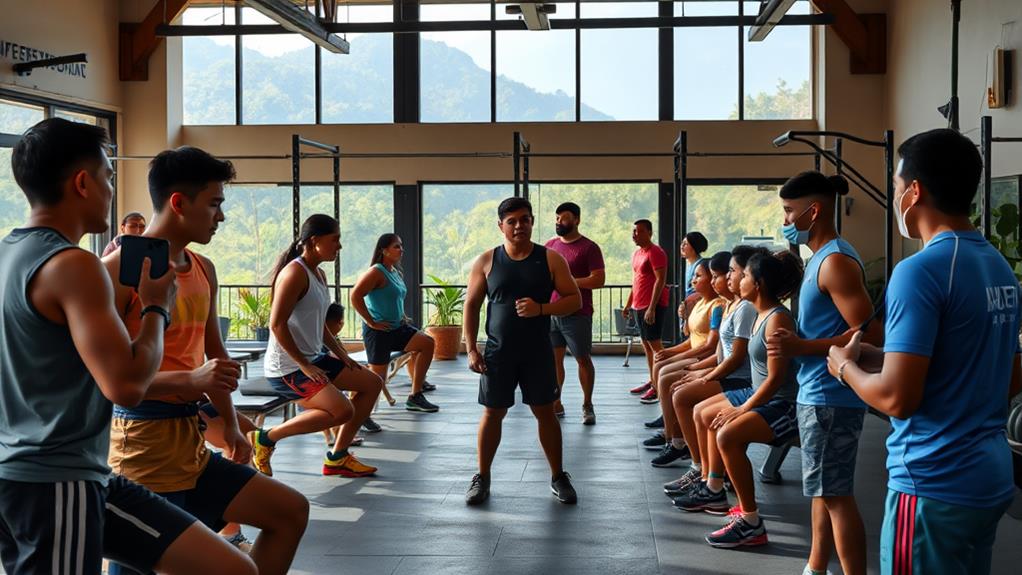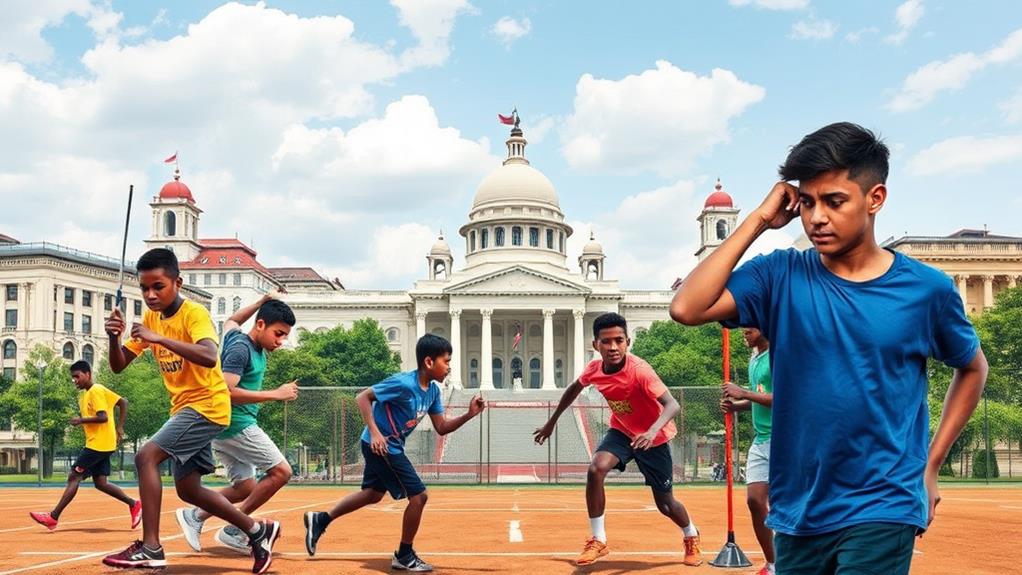The Philippine government plays a crucial role in supporting sports development through funding, infrastructure, and athlete support systems. It allocates around PHP 1.2 billion annually for development, which includes scholarships and cash incentives for medal winners.
For instance, the government provides scholarships to talented young athletes, enabling them to pursue their sporting dreams. The establishment of the Philippine Sports Commission ensures effective oversight of athlete training and welfare, guaranteeing that athletes receive the necessary support to excel in their respective sports.
Athlete support systems are essential for optimal performance, and the government recognizes the importance of health, psychological, and nutritional support. These support systems help athletes prepare physically and mentally, allowing them to perform at their best.
Despite these efforts, challenges persist, such as budget cuts and inadequate facilities, which can affect athlete preparedness. To address these challenges, the government must continue to invest in sports infrastructure and provide sufficient funding for athlete development programs.
Government Policies and Financial Support

The Philippine government plays a vital role in sports development through targeted policies and financial support.
Each year, the government allocates approximately PHP 1.2 billion for sports funding, aiming to increase participation across various demographics. This investment is guided by Republic Act No. 6847, which establishes a framework for sports development and creates the Philippine Sports Commission (PSC) to oversee athlete development and program effectiveness.
Government support is multifaceted, including scholarships and financial aid programs for athletes at different levels.
These initiatives provide essential resources and offer cash rewards and bonuses for medal-winning athletes, motivating them to excel on national and international stages. For instance, the government offers financial aid to student-athletes, enabling them to pursue their education while developing their athletic skills.
The government regularly reviews and adapts its policies to the evolving sports landscape.
This ensures that national sports associations receive continuous support, allowing them to stay competitive and effective. Moreover, the government promotes active transport initiatives, encouraging healthier lifestyles alongside sports participation.
By fostering a robust policy environment and providing financial backing, the Philippine government plays a crucial role in nurturing talent and encouraging community engagement in sports development.
This support ultimately contributes to the nation's athletic success, as seen in the achievements of Filipino athletes in various international competitions.
Infrastructure and Training Programs
Government Investment in Sports Infrastructure
The Philippine government allocates approximately PHP 1.2 billion annually to develop sports infrastructure and training programs. This significant investment enables the Philippine Sports Commission to establish national training camps for elite athletes, enhancing their skills and readiness for international competitions.
Collaboration with the Private Sector
The government partners with the private sector to ensure that sports facilities meet high standards. This collaboration leads to the construction of high-quality sports facilities, such as national training camps.
Challenges in Educational Institutions
Many educational institutions in the Philippines still lack adequate sports infrastructure, hindering opportunities for student-athletes. To address this, the government emphasizes community sports programs, aiming to boost participation and discover local talent.
Current State of Sports Infrastructure and Training Programs
National Training Camps: Established for elite athletes, with PHP 1.2 billion funding.
Educational Institutions: Lacking adequate facilities, with encouragement to improve.
Private Sector Involvement: Collaborates on facility construction, ensuring high-quality environments.
Community Sports Programs: Invests to boost participation and talent, highlighting grassroots commitment.
Health and Psychological Support

Athlete Well-being: A Comprehensive Approach
Physical Health
The Philippine government provides comprehensive healthcare and insurance coverage tailored for athletes, ensuring necessary medical attention during training and competitions.
This coverage safeguards athletes' physical health.
Mental Health and Resilience
Psychological support services are implemented to tackle mental health challenges athletes may face.
These services foster mental resilience, significantly influencing athletes' performance.
Intervention programs for injured athletes facilitate effective rehabilitation, helping them transition smoothly back to competitive sports.
Rehabilitation Program Evaluation
The government evaluates these rehabilitation programs to ensure they enhance athlete recovery and promote adherence to treatment protocols.
Such evaluations are essential for optimizing outcomes and refining approaches.
Work-Life Balance and Post-Sport Careers
Work-life balance initiatives are vital for athletes transitioning to post-sport careers.
Robust support systems help ease their shift and maintain overall mental health.
The combination of healthcare, psychological support, and work-life balance promotes a holistic approach to athlete well-being, ensuring athletes are equipped to excel both during and after their sporting career.
Nutritional Guidance for Athletes
Proper nutrition is essential for Filipino athletes to achieve optimal performance and recovery. A well-planned diet can significantly impact an athlete's success, and the government recognizes the importance of a balanced diet rich in essential nutrients to support overall health and athletic performance.
Nutrient deficiencies are a common challenge many Filipino athletes face. To address these deficiencies, comprehensive nutritional education is vital. This includes providing access to diet consultations with qualified nutritionists and sports scientists who can create effective dietary guidelines tailored to the unique demands of various sports disciplines.
Government support initiatives focus on equipping student-athletes with the knowledge and resources necessary for maintaining optimal diets during rigorous training and competition periods.
Examples of these initiatives include providing access to sports nutritionists, educational workshops, and online resources that offer personalized dietary guidance.
How Has the Pandemic Affected Government Support for Philippine Sports?
The impact of pandemic on philippine sports has been substantial, with government support decreasing as financial resources are diverted to pandemic response. This has led to the cancellation of sporting events, reduced funding for athletes, and limited access to training facilities. Many athletes are struggling to continue their athletic careers due to these challenges.
Challenges in Athlete Development

Financial constraints hinder athlete development in the Philippines. The proposed budget cut to P725 million in 2025, a significant decrease from P1.156 billion in 2024, will directly impact athlete development and their ability to compete in international sports.
Delayed financial support affects athlete preparation. For instance, boxing qualifier Irish Magno experienced late allowances during the 2020 Tokyo Olympics, which affected her preparation. This delay in financial support can make a significant difference in an athlete's performance.
Lack of training facilities increases costs and hinders development. Without standardized facilities, athletes face high travel costs, often reaching P1,000 for each training session. This added expense can be a significant burden for athletes and can limit their ability to train effectively.
Historical neglect has created a cycle of underachievement. Past generations of athletes have also struggled, creating a cycle of underachievement in Philippine sports. This legacy of neglect must be addressed to ensure future generations of athletes have the support they need.
Systemic issues and corruption restrict access to resources. Political exploitation and corruption within the Philippine Sports Commission (PSC) restrict access to essential resources, further hindering athlete development.
Poor sports infrastructure hinders athlete progress. Inadequate facilities hinder athletes' progress and limit their potential for success. The government must address these challenges to ensure that Filipino athletes receive the support they need for proper development and to excel on international platforms.
Future Directions for Philippine Sports
Financial Support is Crucial for Philippine Sports
The Philippine Sports Commission (PSC) is seeking a budget increase to P725 million in 2025 to address the financial challenges facing Philippine sports. This funding is essential for implementing comprehensive sports programs that enhance coaching, mentorship, and infrastructure.
Grassroots Development is Key to Success
Emphasizing grassroots sports development is vital for nurturing future talent and ensuring sustainable growth. Investing in local programs helps create a robust pipeline of athletes ready to represent the nation.
For instance, the PSC can collaborate with local government units to establish sports programs in schools and communities, identifying and developing young athletes from a grassroots level.
Public-Private Partnerships Can Alleviate Financial Burdens
Collaboration between the government and the private sector is encouraged to secure sponsorships and partnerships, which can alleviate financial burdens on athletes and support overall sports development.
This can include partnerships with sports brands, corporations, and philanthropic organizations to provide funding, equipment, and training opportunities for athletes.
Legislative Measures Aim to Improve Athlete Welfare
Proposed legislative measures aim to improve athlete welfare and institutional support, addressing the unique challenges faced by athletes, particularly those from low-income families.
For example, these measures can provide financial assistance, education, and healthcare support to athletes, ensuring they've access to resources that help them succeed.
A Multifaceted Approach is Needed for Success
A multifaceted approach, including a focus on coaching and mentorship, is necessary to elevate athlete performance and promote a more inclusive and prosperous sports culture in the Philippines.
This approach can include training programs for coaches, mentorship initiatives that pair experienced athletes with younger athletes, and sports science programs that provide athletes with access to cutting-edge technology and training methods.
Questions and Answers
How Does the Government Play a Role in Sports?
The government plays a vital role in sports development through funding and infrastructure investments.
The government provides essential funding for athlete development and grassroots programs, which helps to identify and nurture talented athletes from a young age. For instance, the US government invested over $40 million in the Olympic Committee in 2020 to support athlete development programs.
Investments in sports infrastructure promote community engagement and health benefits.
Government investments in sports infrastructure, such as building stadiums, tracks, and community centers, encourage community engagement and provide accessible facilities for people to engage in physical activity. This, in turn, enhances health benefits by promoting a culture of fitness and teamwork.
Youth programs encourage participation in various sports, preparing athletes for international competitions.
Through youth programs, the government encourages participation in various sports, helping to identify and develop talented athletes who can represent their country in international competitions. For example, the US government's "Let's Move!" initiative aims to reduce childhood obesity by increasing access to sports and physical activity programs for young people.
Government support fosters a culture of fitness and teamwork, benefiting individuals and society.
What Is the Role of Local Government in Sport?
Local governments play a crucial role in promoting sports in their communities. They achieve this by organizing youth programs and events, which encourage community engagement and social interaction among residents.
Additionally, local governments allocate funds for developing sports facilities, ensuring that residents have access to quality infrastructure for recreational and competitive activities.
Local governments form partnerships with schools and organizations to enhance sports education and identify talented athletes. For instance, they may collaborate with schools to develop sports curricula or provide coaching clinics for students.
These partnerships foster an environment that supports athletes' development, promoting active lifestyles and increased participation in sports at the grassroots level.
What Is the Philippine Government's Regulatory Body for Professional Sports in the Country?
The Philippine Sports Commission (PSC) is the Philippine government's regulatory body for professional sports.
The PSC establishes a regulatory framework for sports governance, ensuring athlete representation and compliance standards. This framework includes licensing procedures for sports organizations, management of events, and direction of funding allocation to support talent development.
For instance, the PSC oversees the licensing of professional sports leagues, such as the Philippine Basketball Association (PBA), to ensure they meet certain standards. Additionally, the PSC manages events like the Southeast Asian Games, allocating funds to support athlete training and development.
What Is the Role of the Philippine Sports Commission?
The Philippine Sports Commission (PSC) is responsible for funding and developing sports programs in the Philippines. The PSC allocates resources to grassroots programs, which encourage youth participation in sports. For instance, it supports programs that teach kids how to play basketball, volleyball, and other sports in schools and local communities.
The PSC also focuses on preparing athletes for international competitions. To achieve this, it invests in enhancing sports facilities and coaching education. This enables athletes to train in world-class facilities and receive guidance from well-trained coaches.
In addition, the PSC promotes the health benefits of active sports participation. By encouraging people to engage in sports, the PSC helps to combat health problems like obesity and diabetes. This, in turn, contributes to a healthier population.
Despite facing challenges, the PSC remains crucial to advancing the country's sports landscape. Although it faces issues like budget cuts and governance problems, the PSC continues to play a vital role in developing sports in the Philippines.